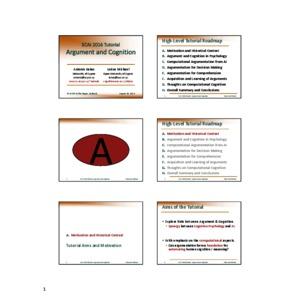Argument and Cognition Tutorial
The ubiquitous use of smart devices to assist human users in their everyday tasks has given a renewed impetus to that area of Artificial Intelligence that aims to understand and automate ordinary or common sense, natural intelligence. This requires systems, called cognitive systems, that can exhibit a behavior that is cognitively compatible with that of human users and that can, therefore, provide personalized solutions by evolving and learning how to adapt to their human users. One way to achieve this requirement of cognitive compatibility is for these systems to compute or reason in a way that is similar to that of human (common sense) reasoning.
Adopting the premise that the logical nature of human reasoning is foundationally different from that of classical logic and closer to the dialectical nature of argumentation — a position that has been advocated by Cognitive Psychology for many years and newly supported by recent studies — this tutorial will aim to show how argumentation can form the underlying theoretical and practical basis for building cognitive systems. Concentrating on the central cognitive task of comprehension, the tutorial will cover material from argumentation theory in AI and models of cognition in Psychology, whose synthesis can support computational cognition with common sense knowledge and can lead to a paradigm of Cognitive Programming. The tutorial will provide hands-on experience with prototype general systems (built within the above argumentation perspective to cognition) that can be used to develop cognitive system applications.




 Unless otherwise stated, all materials created by the FOSTER consortium are licensed under a CREATIVE COMMONS
ATTRIBUTION 4.0 INTERNATIONAL LICENSE.
Unless otherwise stated, all materials created by the FOSTER consortium are licensed under a CREATIVE COMMONS
ATTRIBUTION 4.0 INTERNATIONAL LICENSE.
 This project has received funding from the European Union’s Seventh Framework Programme for research,
technological development and demonstration under grant agreement no 612425.
This project has received funding from the European Union’s Seventh Framework Programme for research,
technological development and demonstration under grant agreement no 612425.